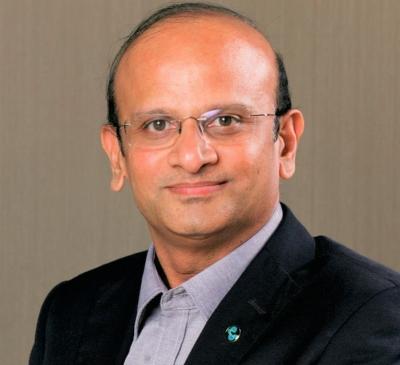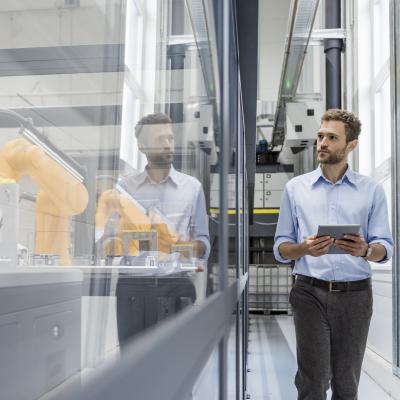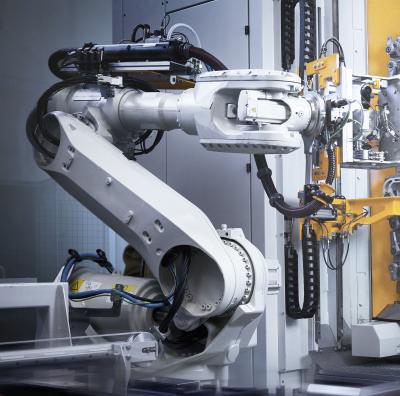| Su | Mo | Tu | We | Th | Fr | Sa |
|---|---|---|---|---|---|---|
| Su | Mo | Tu | We | Th | Fr | Sa |
|---|---|---|---|---|---|---|
-
 Oct 16, 2020IDG Connect
Oct 16, 2020IDG ConnectBlockchain is being used to bring a smart city on the outskirts of Phnom Penh to life. How will its use benefit business? And what are the potential pitfalls?
-
 Oct 16, 2020Professional Security Magazine
Oct 16, 2020Professional Security MagazineMohit Mehta, Vice President and Commercial Leader: Cloud, Infrastructure and Security – Global Growth Markets, at the digital and cloud company Cognizant discusses how IoT devices can balance security requirements with cost and complexity.
-
 Oct 14, 2020Financial IT
Oct 14, 2020Financial ITThere has been a steady stream of transaction tax announcements in the last ten years. High profile Financial Transaction Taxes (FTTs) have been introduced in France and Italy and more specific dividend taxes in the US with 871(m) and 305(c), and Capital Gains Taxes (CGT) introduced globally. As a result, the market has had to wake up to a growing operational challenge on top of those caused by the tide of regulations including MiFID II and EMIR, not to mention planning for the arrival of CSDR.
-
 Oct 8, 2020FutureCIO
Oct 8, 2020FutureCIOEarlier on in the COVID-19 pandemic, organisations faced myriad challenges as they sought to reopen office buildings. Temperatures would need to be scanned, density monitored, personnel distances measured, and contacts tracked. In some cases, hand-washing procedures would need enforcing, too.
-
 Oct 7, 2020PC World Australia
Oct 7, 2020PC World AustraliaWith the NSW Government releasing its first-ever Artificial Intelligence (AI) Strategy and COVID-19 dramatically increasing the pace of digital transformation and the need for AI to enable that change, many businesses are wondering how to navigate the rapidly evolving technology landscape. Moreover, with AI a clear C-suite imperative, businesses must apply AI solutions in smart, economical, and ethical ways. Most importantly, they need to be human-centric.
-
 Oct 7, 2020How Indian IT is Leveraging Analytics to Respond to COVID-19
Oct 7, 2020How Indian IT is Leveraging Analytics to Respond to COVID-19Data analytics has been widely used by businesses to manage hardware and software, employee productivity, and IT security during the lockdown period.
-
 Oct 6, 2020Accounting Today
Oct 6, 2020Accounting TodayThere has been a steady stream of transaction taxes introduced globally in the last 10 years that financial houses have yet to fully tackle, including dividend taxes in the U.S. — 871(m) and 305(c) — and capital gains taxes, and the recent announcement of potential financial transaction taxes (FTTs) in New York and New Jersey, alongside new regulations represent a growing operational challenge. The increase in these types of legislative moves indicates an evolving need for global market solutions to address these types of taxes and the nuances involved at a state-by-state level.
-
 Oct 2, 2020Global Investor Group
Oct 2, 2020Global Investor GroupCum-ex is still an “important issue” that banks should be looking at “right now”, despite the European securities watchdog publishing its final report on the matter on September 24, Daniel Carpenter, head of regulation at Meritsoft, a Cognizant company, told Global Investor.
-
 Oct 1, 2020Hidden in Plain Sight
Oct 1, 2020Hidden in Plain SightWhat happens when the world is forced to hit pause? When cities, states, and entire countries come to a screeching standstill?
-
 Oct 1, 2020Business Today
Oct 1, 2020Business TodayWhy traditional companies are adopting cloud applications in a big way.
-
 Sep 30, 2020Forbes India
Sep 30, 2020Forbes IndiaHealth care and life sciences companies are using artificial and machine intelligence for better insights and improved treatment since the COVID outbreak.
-
 Sep 29, 2020DigiconAsia
Sep 29, 2020DigiconAsiaIn a matter of years, Software-as-a-Service (SaaS) capabilities have become critical to an organization’s functioning. As the pandemic forces organizations everywhere to accelerate their digital transformation roadmaps, the latest digital technologies such as Cloud, AI/machine learning, and internet of things (IoT) have led to a new wave of innovation with demand for plug-and-play software solutions.
-
 Sep 29, 2020International Finance Magazine
Sep 29, 2020International Finance MagazineAI driven solutions are becoming a competitive differentiator for banks and other financial services—delivering a highly personalized customer experience, improving decision-making and boosting operational efficiency. Yet, many financial services institutions remain in an experimental phase and will need to accelerate actual AI deployment. Otherwise, they risk being left behind by digitally native players.
-
 Sep 24, 2020Computer Weekly
Sep 24, 2020Computer WeeklyPhysical workspaces are set to undergo a digital transformation over the coming months. While this trend has been on the cards for some time, few predicted that health and safety would be the prime accelerator towards its adoption.
-

-
 Sep 22, 2020Best's Insurance News & Analysis
Sep 22, 2020Best's Insurance News & AnalysisIt’s a fetching time for pet insurers. Potential customers identify as pet parents and grandparents, willing and financially able to take measures unheard of just a decade ago to make their pets live longer and healthier lives, according to industry professionals.
-
Sep 21, 2020ET CIO
The US-based IT services firm rapidly developed new analytics tools to respond to COVID-19 at various levels of business.
-
Sep 19, 2020Dynamic Business
For businesses thinking of adopting AI, it is important to have a clear governance structure on how AI will be used and an ethical policy surrounding its usage.
-
 Sep 18, 2020Computer Weekly
Sep 18, 2020Computer WeeklyWhile the COVID-19 crisis may have created a lot of uncertainty, what does seem sure is that the practice of remote working is here to stay.
-
 Sep 14, 2020Global Banking & Finance Review
Sep 14, 2020Global Banking & Finance ReviewThe coronavirus pandemic has led to seismic shifts in industry priorities. The post-COVID world will be a highly virtual and personal world. The “shift to digital” has accelerated and all industries are being digitally transformed. Financial institutions (FIs) across the globe continue to deal with the fallout of the pandemic.
-
Sep 14, 2020The Week
Jobs that have become highly desirable in the post-pandemic scenario.
-
Sep 14, 2020Information Age
With the growth of Artificial Intelligence (AI) applications in businesses comes the responsibility to apply these AI solutions in a smart, ethical and economically friendly way. Every new application of the technology brings its own unique challenges, so the need to constantly monitor AI use in business is vital. In light of this, here are five key things to consider when implementing, or even thinking about implementing, AI into your company.
-
 Sep 11, 2020TechRadar Pro
Sep 11, 2020TechRadar ProThe traditional career model first articulated in the early 1900s by Robert Owen as “eight hours labor, eight hours recreation, and eight hours rest” is still around today. Over 100 years on, the workforce is much more diverse and the needs and demands of employees have evolved.
-
Sep 10, 2020Industry Week
As economies worldwide begin recovering from COVID-19 shutdowns, companies that safely and responsibly reopen their physical spaces at scale can have a distinct competitive advantage over those that cannot do so.
-
 Sep 7, 2020ASEAN Business
Sep 7, 2020ASEAN BusinessThe world is becoming real-time — real-time decision-making, real-time experiences, real-time customer service, and real-time payments. The Covid-19 pandemic has further accelerated the use of digital payments as nobody wants to deal with cash. Once seen as a convenience, digital payments have become a necessity.
-
 Sep 2, 2020HR C-Suite
Sep 2, 2020HR C-SuiteThe events of the past six months have thrust HR and business leaders into many new realities. Across industries, our workforces and workplaces are being fundamentally redefined, and the very nature of the employee-employer relationship reshaped.
-
 Aug 25, 2020Chain Store Age
Aug 25, 2020Chain Store AgeAs we approach the end of summer, most retailers have realized that the impact of the pandemic will be long-lasting, especially when it comes to shopping in-store. The new normal requires new safety protocols and innovative experience-oriented value propositions to attract and reassure consumers.
-
 Aug 25, 2020The Leadership Review
Aug 25, 2020The Leadership ReviewBusiness leaders must be sensitive to the needs and desires of workers from all walks of life and ensure all voices are heard and appreciated. In fostering a diverse and inclusive workplace, leaders create a corporate culture where every individual is valued.
-
 Aug 25, 2020protocol
Aug 25, 2020protocolMaintenance of America's strength in technology – and thus its leadership in the world - rests on a renewed commitment to the underlying principles that made it strong in the first place – a focus on the future, an openness to disruption, and providing access to opportunity.
-
 Aug 24, 2020Business Roundtable
Aug 24, 2020Business RoundtableCOVID-19’s grave public health, economic, and geopolitical consequences have underscored how interdependent the world’s people, countries, and institutions are. This pandemic has also emphasized the urgency of international cooperation and collective innovation to solve a complex global problem.
-
 Aug 20, 2020Retail Technology Innovation Hub
Aug 20, 2020Retail Technology Innovation HubIt is no secret that the coronavirus outbreak has disrupted all industries across the globe. Unfortunately for the retail sector, it has been one of the most significantly impacted.
-
 Aug 19, 2020Toolbox HR
Aug 19, 2020Toolbox HRHR’s role will become increasingly vital as the world of work changes. The growing reliance on digital technologies, coupled with the impact of the coronavirus pandemic, accelerates our transition toward the future of work.
-
 Aug 19, 2020protocol & ITI
Aug 19, 2020protocol & ITIAs the world begins to recover from the COVID-19 pandemic, leaders are looking to technology for answers to how to get people back to work and get our economy back on track. As we begin to build the economy of the future, how can technology enable more inclusive opportunity?
-
 Aug 13, 2020NS Insurance
Aug 13, 2020NS InsuranceAs millennials become the largest generation owning and spoiling pets, insurers need to embrace new forms of technology to beat the competition.
-
 Aug 12, 2020
Aug 12, 2020In a world where technology enables everything to be artificial, how do we stay human? Futurist Benjamin Pring, Managing Director of Cognizant's Center for the Future of Work, has a few pointers for HR leaders.
-
 Aug 12, 2020Harvard Business Review
Aug 12, 2020Harvard Business ReviewThe Coronavirus has drastically reshaped the economy and the labor force. Since its rapid spread around the globe, we have experienced titanic shifts in how we work, where we work, and the technologies we use to stay connected. Such massive change is escalating the importance of HR’s role within organizations.
-
 Aug 11, 2020Forbes India
Aug 11, 2020Forbes IndiaIn a special issue from Forbes India, Cognizant CEO Brian Humphries was named among the Ultimate 10 COVID-19 Changemakers as a business leader who is meeting the pandemic head-on. Humphries' profile can be found on page 23.
-
 Aug 8, 2020Axios
Aug 8, 2020AxiosThe pandemic has accelerated shifts in the job market that will prioritize digital skills of all kinds. But the sheer job destruction of the past few months is so great that even the best-prepared fields haven't escaped losses.
-
 Aug 7, 2020HR Zone
Aug 7, 2020HR ZoneThe last decade – and 2020 in particular – has seen dramatic shifts in the way we work, and more change is yet to come. As technology evolves, so too will the HR job roles required to manage all of this
-
 Aug 7, 2020ESG Today
Aug 7, 2020ESG TodayCognizant has hired Sophia Mendelsohn as its new Chief Sustainability Officer and Global Head of ESG. In her new role, Mendelsohn will work with Cognizant leadership to define and execute the company’s strategy around corporate citizenship related to environmental, social, and governance matters.
-
 Aug 7, 2020THE WEEK
Aug 7, 2020THE WEEKIn an exclusive interaction with THE WEEK, he talked about the restructuring and the growth challenge.
-
 Aug 6, 2020FinTech Today
Aug 6, 2020FinTech TodayPPP was created in response to COVID-19, and has been successful despite some confusion and frustration among the many businesses applying for loans. To better understand the program and how banks can successfully service businesses who’ve applied, we sat down with Jack Leach, commercial banking practice leader at Cognizant.
-
 Aug 6, 2020Global Banking & Finance Review
Aug 6, 2020Global Banking & Finance ReviewBusinesses around the world are falling victim to the significant impact that COVID-19 has generated and are now feeling the consequences it is set to leave in its wake. The financial services sector is no different.
-
 Aug 5, 2020Machine Meets World
Aug 5, 2020Machine Meets WorldBret Greenstein, SVP and Global Head of AI & Analytics at Cognizant, talks artificial intelligence with Infinia ML’s James Kotecki.
-
 Aug 4, 2020Frontier Enterprise
Aug 4, 2020Frontier EnterpriseThe overarching agenda for organisations to achieve success is highly susceptible to change. Decades’ worth of IT innovation has led to continually shifting priorities for organisations, and cost-optimisation or speed can no longer be the sole focus for companies.
-
 Jul 31, 2020Asset Servicing Times
Jul 31, 2020Asset Servicing TimesAs the industry awaits a decision from the ESMA on a possible further delay to the CSDR settlement discipline regime, Daniel Carpenter, head of regulation at Meritsoft, a Cognizant company, explained that market participants need to be prepared for the significant impact of the new rules when they do come into force.
-
 Jul 31, 2020U.S. Chamber of Commerce Foundation Path Forward Series
Jul 31, 2020U.S. Chamber of Commerce Foundation Path Forward SeriesFrom how remote work is changing the ways we communicate with colleagues and supervisors, to what our workplaces might look like when we return, this week's edition of Path Forward explored how COVID-19 is reshaping the future of work.
-
 Jul 31, 2020Mint
Jul 31, 2020MintIn an interview, Brian Humphries, CEO, Cognizant talks about the business visibility, the H1-B visa impact and the exits.
-
 Jul 28, 2020Australian Manufacturing News
Jul 28, 2020Australian Manufacturing NewsEmployee safety is a major concern for Australian mining corporations. Even today, with arguably the best mining safety regulations in the world, there continues to be serious injuries and sometimes fatalities. Fortunately, the industry is in a good position to address these concerns with the help of technological advancements in automation.
-
 Jul 27, 2020Finance Digest
Jul 27, 2020Finance DigestBusinesses around the world are falling victim to the significant impact that COVID-19 has generated and are now feeling the consequences it is set to leave in its wake. The financial services sector is no different. Banks were dealing with hurdles even prior to the
-
 Jul 24, 2020ITProPortal
Jul 24, 2020ITProPortalRemotopia empowers us with networks and platforms to create, connect and accomplish.
-
 Jul 23, 2020Retail Insight Network
Jul 23, 2020Retail Insight NetworkSince the start of the COVID-19 coronavirus pandemic, technology has played a vital role in ensuring retailers survive a low footfall and a drop in sales. Even beforehand, solutions like e-commerce and augmented reality (AR) were becoming increasingly popular, while high street shops saw fewer visitors.
-
 Jul 23, 2020Horses for Sources
Jul 23, 2020Horses for SourcesIn an interview with HFS CEO Phil Fersht, Brian moves beyond the business talk and straight to the deep end – the personal, the humble, the lessons learned – and the stakes set firmly in the ground.
-
 Jul 22, 2020ZigZag Podcast
Jul 22, 2020ZigZag PodcastBen Pring discusses the shift to remote work post-pandemic.
-
 Jul 21, 2020PM Today
Jul 21, 2020PM TodayWe are now all involuntary participants in the seismic disruption shaking the foundations of society, technology, economics, healthcare and more.
-
 Jul 21, 2020Intelligent CIO
Jul 21, 2020Intelligent CIOThe guest experience has always been at the heart of the hospitality industry. As new technology becomes available, we are already seeing hotels across the world embrace innovation to further enhance and personalize that experience, for example, hotels in Singapore are trialling facial recognition for faster check-ins.
-
Jul 21, 2020Insurance Edge
In the midst of COVID-19, puppies and kittens have emerged as go-to companions to get us through the extended public healthcare crisis. This is one important reason pet insurance is touted to be the next hot growth segment for personal insurance carriers, as the global market is projected to surpass $10 billion by 2025 and grow 6.7% annually.
-
Jul 20, 2020The Economic Times
Cognizant has hired the former director of technology transformation of the US government, Anil Cheriyan as its new Executive Vice President of Strategy and Technology.
-
Jul 17, 2020Claims Magazine
No one could have predicted the global coronavirus pandemic or its impact on business and everyday life. The COVID-19 crisis changed how people work, study, shop and make decisions, affecting every business sector.
-
Jul 17, 2020Manufacturing Tomorrow
The COVID-19 crisis represents perhaps the greatest challenge to the way companies operate in living memory. Almost literally overnight, entire industries were shut down and production abruptly halted or curtailed, as governments across the world implemented "social distancing" rules that limited the number of people who could be together in a single place.
-
 Jul 14, 2020FinOps Report
Jul 14, 2020FinOps ReportPredict and prevent– that’s what back-office operations managers at buy and sell-side firms preparing for Europe’s Central Securities Depositories Regulation (CSDR) settlement discipline regime are starting to think about so they won’t have to pay hefty financial penalties or endure buy-in requirements if they fail to settle their European trades on time.
-
 Jul 14, 2020Business Today
Jul 14, 2020Business TodayMassive change produced by the #COVID19 recession will drive renewed double-digit growth for certain firms and send others to irrelevance says Malcolm Frank via Business Today.
-
 Jul 12, 2020Technology Magazine
Jul 12, 2020Technology MagazineOne of the biggest expectations we have of digital transformation is the hope that it will bring fresh impetus, particularly for the industrial sectors. Internet of Things (IoT) or Industrial internet of things (IIoT) is the pillar on which these hopes are built.
-
Jul 8, 2020Forbes
Think about this: for decades now, some of the most innovative and game-changing organizations on the planet have operated completely remotely and virtually from day one, releasing product after product, without even paying their participants.
-
 Jul 8, 2020Manufacturing Global
Jul 8, 2020Manufacturing GlobalWith Industry 4.0 embraced at scale over the past few years, COVID-19 has only accelerated its influence in the manufacturing space.
-
Jul 3, 2020Finance Derivative
In addition to responding to changing customer expectations, higher operating costs, new technology, and an evolving regulatory landscape, financial services organizations now also face the uniquely challenging business environment created by COVID-19.
-
 Jul 1, 2020TED
Jul 1, 2020TEDWhile most of us are content to guess, there are other people who are actively figuring it out and their findings and educated assumptions could help us all prepare for the future. Among them is Ben Pring, IT futurist and cofounder of Cognizant’s Center for the Future of Work, which tracks trends across technology, business and society.
-
 Jul 1, 2020Manufacturing Global
Jul 1, 2020Manufacturing GlobalIndustry experts discuss the evolution of automation in manufacturing and how it can help the industry navigate the challenges of COVID-19.
-
 Jul 1, 2020Manufacturing Global
Jul 1, 2020Manufacturing GlobalManufacturing stands to make considerable progress through Big Data and AI, but the complex challenges of the industry have slowed uptake.
-
 Jul 1, 2020UK Tech News
Jul 1, 2020UK Tech NewsThe anticipated changes to the world of HR will give rise to the emergence of many new roles, which are highlighted in a recent joint report from Cognizant’s Center for the Future of Work and Future Workplace: 21 HR jobs of the future.
-
 Jun 29, 2020Personnel Today
Jun 29, 2020Personnel Today“As HR leaders are often consumed with handling impending disruption to jobs due to automation, changing workforce demographics or multi-generational workforces, they have less time to address the key issue of how these massive transformations will impact the organisation – and fundamentally change the role of HR professionals,” said Robert Hoyle Brown, vice president of the Cognizant Centre for the Future of Work.
-
 Jun 29, 2020Top Employers Institute
Jun 29, 2020Top Employers InstituteCognizant formed its Embrace network to drive and support an inclusive working environment for LGBTQIA+ colleagues. The community has become more important than ever during the pandemic, when employees have not been able to be physically together.
-
 Jun 24, 2020northjersey.com
Jun 24, 2020northjersey.comThe Boys & Girls Club of Paterson and Passaic says it has been providing local residents with more than 2,000 meals per week using a private donation that originally was supposed to for an after-school program.
-
 Jun 18, 2020European Pharmaceutical Manufacturing
Jun 18, 2020European Pharmaceutical ManufacturingPari Sanghavi, senior director, life sciences supply chain and manufacturing at Cognizant and Jim Lehane, global leader business development at Zenith discuss how manufacturing must change following COVID-19.
-
 Jun 15, 2020UK Tech News
Jun 15, 2020UK Tech NewsMany leaders in large companies are out of sync and out of touch with their workforce, markets, and competitive landscapes. That is according to research, which found that only 12 per cent of global executives feel their business leaders have the right mindsets to lead them forward in a new world of work and credibly transform the business.
-
 Jun 15, 2020ASEAN Business
Jun 15, 2020ASEAN BusinessCOVID-19 has taken a dramatic toll on many industries, most notably retail. Up until now, the retail industry flourished by ensuring higher footfall to boost sales. Today, however, retailers need to tackle the epic challenge of working — within curbs — to manage footfall, while meeting changing consumer demands. Will we ever again look at increasing footfall as a measure to boost sales?
-
 Jun 11, 2020A1 Retail
Jun 11, 2020A1 RetailSocial distancing was a virtually unknown expression until recently. Today it is a critical prevention strategy for people around the globe. As it becomes a cultural norm – and as consumers seek ensured hygiene, health, security, and trust – how retailers and brands amend their customer experiences today will have implications on future loyalty-building and growth efforts.
-
 Jun 10, 2020TechTarget
Jun 10, 2020TechTargetFinding new ways to boost supply chain management efficiency is more critical than it's ever been. Robotic process automation -- or RPA -- is one technology that may help.
-
Jun 10, 2020Information Technology Industry Council Podcast
Jason Oxman is joined on the Download On Tech podcast by Cognizant’s Global SVP Head of Artificial Intelligence Bret Greenstein and Vice President of Government Affairs & Legal Tobi Young. Bret and Tobi cover how Cognizant is responding to the COVID-19 crisis for their employees and for their customers, as well as the ways that technology is being utilized to combat the effects of COVID-19 and ways that the use of technology by individuals, companies, and governments might be different moving forward.
-
 Jun 2, 2020IoT Now
Jun 2, 2020IoT NowOne of the expectations we have of digital transformation is the hope that it will bring fresh impetus, particularly for the industrial sectors. Internet of Things (IoT) or Industrial internet of things (IIoT) is the pillar on which these hopes are built, says Andreas Golze, senior vice president at Cognizant.
-
 May 28, 2020PBS News Hour
May 28, 2020PBS News HourMany Americans are working from home during the coronavirus pandemic, and it’s unclear when people will or should return to the workplace. The shift toward more remote work could have significant repercussions for employees, companies and the marketplace. Economics correspondent Paul Solman explores these transformations -- and their advantages and drawbacks -- in a two-part series.
-
 May 27, 2020Global Banking & Finance Review
May 27, 2020Global Banking & Finance ReviewFrom the CME surpassing 25 million contracts for 15 continuous trading days, to Euronext share trading transactions being up 92%, March was an unprecedented month for trade volumes.
-
 May 27, 2020The Economic Times
May 27, 2020The Economic Times"Cognizant has designed and developed an online test booking facility for a retail pharma chain, helping millions of patients across the United States save time by quickly locating test centres and scheduling tests," says Sairamkumar Jayaraman.
-
 May 26, 2020TED
May 26, 2020TEDCOVID-19 will change everything -- and the way we work and learn will be no exception. Will the traditional office structure be a thing of the past? Could our education system start to look more like a lifelong journey? Tech futurist Ben Pring and head of TED Chris Anderson tackle these questions and more in this thought-provoking interview.
-
 May 25, 2020BusinessLine
May 25, 2020BusinessLineHumphries and his team of 2.90 lakh employees — a majority of them in India — are gearing up to face the challenges post Covid. In this interaction with BusinessLine, Humphries discusses the impact of the pandemic and the road ahead.
-
 May 24, 2020SiliconANGLE
May 24, 2020SiliconANGLECrisis plants the seeds of ingenuity, and as the world struggles out of the COVID-19 pandemic and into an unknown new normal, it’s clear that entire industries will be transformed by innovations that have emerged to combat the disease.
-
 May 21, 2020IT Visionaries Podcast
May 21, 2020IT Visionaries PodcastOn this episode of IT Visionaries, Allen Shaheen talks about his evolving relationship with technology, how companies are adapting to and embracing technology more than ever, and why reinvesting in STEM programs is the only way to ensure a prosperous future.
-
 May 21, 2020Bangkok Post
May 21, 2020Bangkok PostThe world of work is changing faster than ever, and machine intelligence is at the centre of this change. Most recently, artificial intelligence (AI) has played a leading role in the fight against Covid-19. Scientists have used AI to help predict future outbreak zones, sift through research, and even run simulations on drugs to determine their efficacy.
-
 May 21, 2020TechRepublic
May 21, 2020TechRepublicIt's safe to say most aspects of life will be quite different after the global coronavirus pandemic ends. A new report, "After the Virus" from digital firm Cognizant, looks at just how different things will be, from national politics to socioeconomics, work, business, and well, life in general.
-
 May 21, 2020RetailBiz
May 21, 2020RetailBizCognizant head of industries for Australia and New Zealand, Gaurav Sharma said Australians are already spending more time online than usual, and as Click Frenzy drives traffic to websites, retailers must facilitate smooth e-commerce experiences.
-
 May 20, 2020The Business Times
May 20, 2020The Business TimesAfter the coronavirus pandemic, the world will be quite different. Whether the lockdowns last weeks or months, very little will remain unchanged. In a bid to contain the spread of Covid-19, governments around the world have instituted health monitoring policies, leveraging GPS and other data from a variety of personal devices.
-
May 19, 2020Business Review
Having visibility of your own skills, including level of expertise allows you to be aware of your evolution and measure your growth, your professional profile. You set your goals to develop autonomy, and measure… While making constant, incremental improvements.
-
May 13, 2020Manufacturing Today Europe
Premankur Roy Paladhi shared these recommendations: “To cope with the coronavirus pandemic, consumer goods and retail organisations need a robust business continuity plan (BCP), one that is based on a holistic supply chain strategy and built on flexible and strong digital foundations. Any BCP should anticipate disruptions and provide proactive recommendations to keep pace with fluctuating demand and fulfilment cycles.
-
 May 12, 2020CIO Tech Asia
May 12, 2020CIO Tech AsiaCountries around APAC are starting to phase slowly back into normalcy with additional safety measures like COVID-19 tracking apps for citizens. However traditional businesses have had to adapt to new realities of a post-virus world and the implications for CIOs will be profound. The days of the IT department being responsible for infrastructure and operations, with a relentless focus on cost reduction, are gone.
-
May 12, 2020Axios
In a recent report forecasting life after the virus, Cognizant's Center for the Future of Work envisioned the creation of a massive Health Security Agency that would mandate automated illness scanning for any building, space or country.
-
May 12, 2020IT Pro
“5G will help realise the benefits from the evolving IoT environment, including the development in endpoint devices such as environmental and situational sensors, vehicles, wearables, drones, robots, and virtual reality equipment,” says Rohit Gupta, vice president and head of manufacturing, logistics, energy and utilities, Europe at Cognizant.
-
 May 11, 2020Forbes
May 11, 2020Forbes“Inclusive leaders recognize the realities of what it means to work virtually and the need to be flexible," says Ben Pring, Director of Cognizant’s Center for the Future of Work.
-
 May 11, 2020The Economic Times
May 11, 2020The Economic TimesCognizant CEO Brian Humphries says the restructuring done last year has helped the company lay the path for M&As and a better standing in the cloud technology market, despite a difficult business climate this year due to Covid-19. Edited excerpts of an interview with ET.
-
 May 8, 2020Business Standard
May 8, 2020Business StandardIn a Q&A, Brian Humphries says his firm has handled the ransomware attack well and doesn't see any impact on client engagement.
-
 May 8, 2020Mint
May 8, 2020MintCognizant Technology Solutions Corp on Friday posted revenues of $4.2 billion for the first quarter ended March, up 3.5% year-on-year in constant currency. In an interview, Brian Humphries, chief executive officer, spoke about growth drivers, demand environment and its strategy to sail through the covid-19 crisis.
